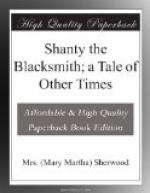But whilst these two were standing, as we said, at the door, suddenly, a low moan reached their ears, as coming from their left, where the roof of the shed being lengthened out, afforded shelter for any carts, or even, on occasion, waggons, which might be brought there, for such repairs as Shanty could give them. At that time, there was only one single cart in the shed, and the cry seemed to come from the direction of this cart. Dymock and Shanty were both startled at the cry, and stood in silence for a minute or more, to ascertain if it were repeated. Another low moan presently ensued, and then a full outcry, as of a terrified child. Dymock and Shanty looked at each other, and Shanty said, “It is the beggar woman. She is still skulking about, I will be bound; hark!” he added, “listen! she will be stilling the child, she’s got under the cart.” But the child continued to screech, and there was neither threat nor blandishment used to still the cries.
Dymock seemed to be so thoroughly astounded, that he could not stir, but Shanty going in, presently returned with a lighted lanthorn, and an iron crow-bar in his hand; “and now,” he said, “Mr. Dymock, we shall see to this noise,” and they both turned into the out-building, expecting to have to encounter the tall beggar, and with her perhaps, a gang of vagrants. They, however, saw only the infant of two years’ old, who had lain like a thing dead on the woman’s lap, though not dead, as Shanty had feared, but stupified with hollands, the very breath of the baby smelling of the spirit when Dymock lifted it out of the cart and brought it into the interior shed. Shanty did not return, till he had investigated every hole and corner of his domain, with the crow-bar in one hand, and the lanthorn in the other.
The baby had ceased to cry, when brought into the shed, and feeling itself in the arms of a fellow-creature, had yielded to the influence of the liquor, and had fallen again into a dead sleep, dropping back on the bosom of Mr. Dymock.
“They are all off,” said Shanty, as he entered the house, “and have left us this present. We have had need, as that young rogue said, of the horse-shoe over our door. We have been over-reached for once; that little one is stolen goods, be sure, Mr. Dymock,—some great man’s child for aught we know,—the wicked woman will not call again very soon, as she promised, and what are we to do with the child? Had my poor wife been living, it might have done, but she is better off! What can I do with it?”
“I must take it up to the Tower,” said Mr. Dymock, “and see if my aunt Margaret will take to it, and if she will not, why, then there are charity schools, and poor-houses to be had recourse to; yet I don’t fear her kind heart.”
“Nor I neither, Mr. Dymock,” said Shanty, and the old man drew near to the child, and holding up his lanthorn to the sleeping baby, he said, “What like is it? Gipsy, or Jew? one or the other; those features, if they were washed, might not disgrace Sarah or Rachel.”




